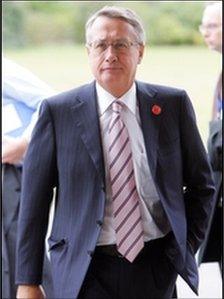Australia's austerity-type budget
- Published
Australia, a star performer of the post-financial-crisis global economy, is about to hand down a budget with shades of European austerity.
For all the talk of the wonder from down under - an economy that has enjoyed 20 consecutive years of growth - the country's Treasurer, Wayne Swan, has warned of "substantial savings".
Australia's finances are far from dire.
Analysts expect the treasurer to reveal a deficit of 50 billion Australian dollars, or 3.6% of the country's gross domestic product, the sort of figures many European finance ministers can only dream of.
Still, it is a more sizeable deficit than the government forecast last November.
A summer of disasters, which saw massive flooding in Queensland and Victoria, a tropical cyclone on the northern Queensland coast and bush fires in Western Australia, has impacted the country's bottom line. So, too, has the Japanese earthquake, which has cut exports by two billion Australian dollars.
The soaring Australian dollar, which has gained 18% in value during the past year, has also cut export revenues.
Breaking through $1.10 last week, the dollar has been trading at its highest levels since it was floated in 1983.
Retail is also flat, with many Australian consumers thought to be paying off credit cards and reducing their overall debt. Australian shopkeepers speak of a twin-speed economy rather than a wonder from down under.
Most intriguingly of all, perhaps, Mr Swan has argued that the resumption of Australia's mining boom - mining boom mark two, as it is now called - will deliver nowhere near the revenue bonanza of mining boom mark one.
The rivers of gold have not run dry. Far from it. Soaring commodity prices have helped boost Treasury coffers. But Mr Swan has argued their current is not so strong.
He made the case most strongly in a speech before the Queensland Press Club last month.
"During mining boom mark one, revenues were boosted by a sharply rising terms of trade, rapid credit and consumption growth, rapid asset price growth, and solid corporate profitability across the board.
"Today, there are already very high terms of trade, a high dollar, business credit is tight, people are saving instead of spending, and the mining industry, while making massive profits, is reinvesting heavily and claiming tax deductions for those investments".
Last year, however, the Labor party dropped its proposals for a windfall tax for super-profits in the resources sector, in the face of massive opposition from mining giants like Rio Tinto and BHP Billiton.
Mr Swan, who is delivering his fourth budget, is constrained by his government's commitment to return the Australian budget to surplus by 2012-13.
Here his thinking is arguably driven as much by politics as fiscal probity.

Australian Treasurer Wayne Swan says there will be cuts despite the booming economy
The Labor party fears that going back on that pledge would undermine its economic credibility and hand the conservative opposition a political opening.
Partly for that reason, the Prime Minister, Julia Gillard, and her treasurer have sought to portray themselves as deficit hawks.
This is also the minority Labor government's first budget since last year's election, and there is a feeling that it makes sense to announce austerity measures now to increase the scope for delivering give-away budgets later in its term in office.
From where will the cuts come?
A welfare crack-down for a start. Based on pre-budget leaks, the government is expected to limit unemployment benefits for the young.
The government has already announced that the long-term unemployed will be subject to new stipulations in order to retain their benefits.
There will be changes to the health rebate system, which will target higher earners, and probably cuts to defence spending.
Mr Swan is also expected to increase the annual intake of skilled immigrants to ease skills shortages, particularly in the resources sector, a recurring problem for the Australian economy.
The budget will not include financial projections for the government's unpopular proposals for a carbon tax.
The Liberal opposition leader, Tony Abbott, has said it would be a budget with "a hole in its heart".
As for the government's pledge to return the budget to surplus during the next two years, the shadow treasurer, Joe Hockey, remains to be convinced.
"Everything this government does turns to custard," said Mr Hockey. "It's never going to deliver a surplus."
During his prime-time budget speech, delivered from the floor of the House of Representatives, Mr Swan will express cautious optimism.
"There is short-term softness in the economy caused by natural disasters and international uncertainty but there's medium-term strength," Mr Swan said in his pre-budget weekly economic note.
"Our fundamentals are strong, with low unemployment, record terms of trade and a huge pipeline of investment in the resources industry."
This is being portrayed as a tough budget, even though the times really are not that tough.
- Published6 April 2011
- Published2 February 2011
- Published11 January 2011